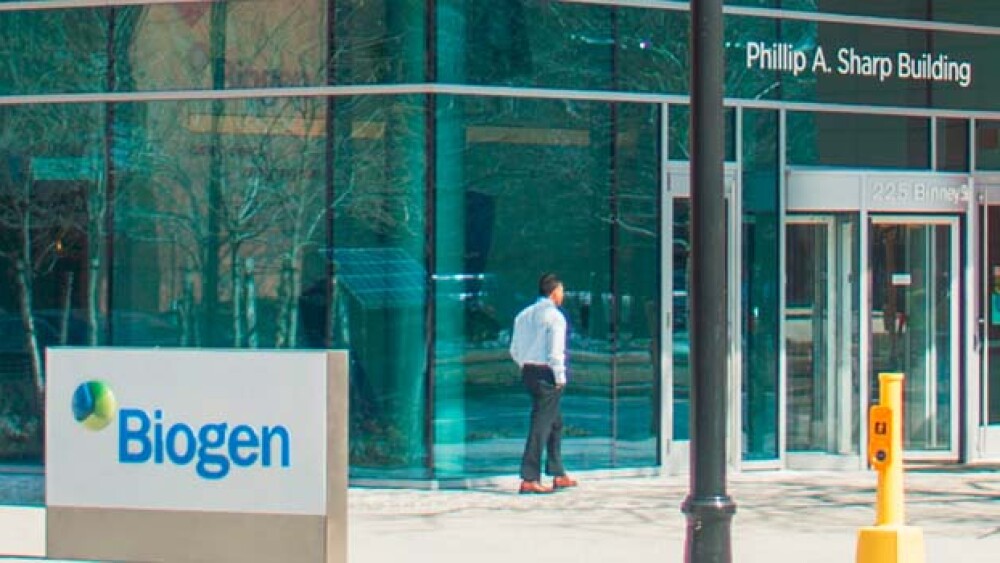Shares dropped by 9.1 percent, the biggest intraday decline since June 2016.
At yesterday’s Leerink Healthcare Conference, Biogen’s chief medical officer, Al Sandrock, shook up investors by saying that the company had added 510 more patients to its clinical trial of aducanumab in Alzheimer’s disease. “We did see more variability on the primary endpoint than assumed when we did the initial sample size estimations,” he said to the crowd of investors and analysts. “So we decided to increase the sample size to maintain 90 percent power.”
This seems to be an oblique way of saying the company wasn’t getting the results it expected, so it was increasing its sample size. The decision is complicated by the fact that Biogen hasn’t seen all the unblinded data due to the structure of the trial.
Leerink analyst Geoffrey Porges wrote, “The expansion in enrollment decision was made by the company after they analyzed blinded results for the performance of the primary endpoint (18 month CDR-SB) in the patients who have reached the primary endpoint so far. These additional patients are required to maintain 90 percent power for the trial due to ‘variability.’ Biogen has not seen the data by arm, but to maintain the powering needed to add the additional enrollees given the variance seen so far.”
CDR is The Clinical Dementia Rating, SB refers to Sum of Boxes, which combined are a way to assess both cognitive and functional aspects of Alzheimer’s disease progression.
Investors were not enthused. Shares dropped by 9.1 percent, the biggest intraday decline since June 2016.
Bloomberg describes the issue: “The problem seems to have been that the tests were creating too much statistical noise, and not giving researchers a clear indication of whether or not the drug was helping patients.”
Biogen indicates that the option to expand the trial was part of the trial design, although Brian Skorney, an analyst at Robert W. Baird & Co. thinks Biogen’s announcement may not have gone over the way it was intended. He told Bloomberg, “Generally, it’s not a good sign when the way you designed your study isn’t working out appropriately. Aducanumab is considered a very risky pipeline candidate to begin with, just given the history of Alzheimer’s trials.”
And timing was definitely a factor, as well. Sandrock’s announcement came the same day Merck & Co. announced it was halting its Phase III trial of verubecestat (MK-8931) for Alzheimer’s because an external Data Monitoring Committee (eDMC) had recommended it, saying the likelihood of benefits didn’t outweigh the risks. Merck hasn’t indicated if itClar’s totally abandoning verubecestat, but it’s yet another high-profile failure of an Alzheimer’s drug in late-stage trials. And it is another brick added to criticism of the beta-amyloid theory of Alzheimer’s disease.
Although many researchers continue to stand by the amyloid hypothesis—that the primary cause of the brain damage caused by the disease is the result of accumulation of beta-amyloid plaques in the brain—not all agree. Amit Roy, founding partner of Foveal, an independent investment research group, told The Financial Times in February 2017, after an earlier failure of Merck’s verubecestat, “All of these Alzheimer’s drugs fail for the same reason. We do not understand the science of what causes Alzheimer’s, and instead look at things associated with the disease in the hope that modifying them with drugs will modify the illness. Until drugmakers can do more than describing what changes happen in Alzheimer’s and prove that a certain mechanism actually causes the disease, these drugs will keep failing—the underlying science is too immature.”
At the very least, Biogen’s announcement indicates that trial results for aducanumab will likely be later than expected. Some data was expected by the end of this year, but that probably won’t happen now. Michael Yee, an analyst with Jefferies, wrote in a note, “Market will swing back to uncertainty on the Alzheimer’s pendulum based on trial changes, and given data is not likely until 2020 (in our view) and an interim seems unlikely given disclosures about variability, while we maintain a positive stance on data in 2020, we think (Biogen) needs to go out and buy de-risked neuro/orphan companies to ‘change the narrative’ to being a binary Alzheimer’s company to one with products even if Alzheimer’s doesn’t work.”





